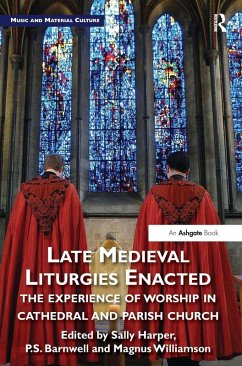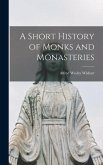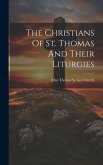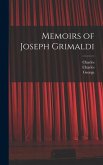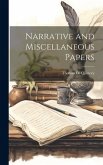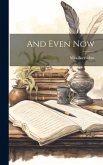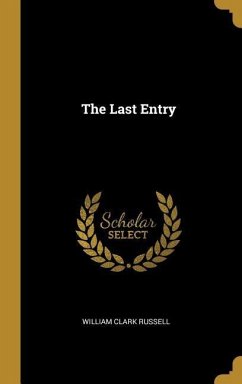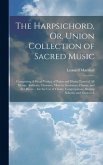Late Medieval Liturgies Enacted
The Experience of Worship in Cathedral and Parish Church
Herausgeber: Harper, Sally; Williamson, Magnus; Barnwell, P.
Late Medieval Liturgies Enacted
The Experience of Worship in Cathedral and Parish Church
Herausgeber: Harper, Sally; Williamson, Magnus; Barnwell, P.
- Gebundenes Buch
- Merkliste
- Auf die Merkliste
- Bewerten Bewerten
- Teilen
- Produkt teilen
- Produkterinnerung
- Produkterinnerung
This book critically explores ways in which our understanding of late medieval liturgy can be enhanced through present-day enactment. Discussion of the processes of the enactments is complemented by contextual studies, with particular emphasis on the provision of music. A distinctive feature of the work is that it seeks to understand the experiences of different groups within the medieval church - the clergy, their assistants, the singers, and the laity.
Andere Kunden interessierten sich auch für
![A Short History of Monks and Monasteries A Short History of Monks and Monasteries]() Alfred Wesley WishartA Short History of Monks and Monasteries37,99 €
Alfred Wesley WishartA Short History of Monks and Monasteries37,99 €![The Christians Of St. Thomas And Their Liturgies The Christians Of St. Thomas And Their Liturgies]() The Christians Of St. Thomas And Their Liturgies41,99 €
The Christians Of St. Thomas And Their Liturgies41,99 €![Memoirs of Joseph Grimaldi Memoirs of Joseph Grimaldi]() Joseph GrimaldiMemoirs of Joseph Grimaldi38,99 €
Joseph GrimaldiMemoirs of Joseph Grimaldi38,99 €![Narrative and Miscellaneous Papers Narrative and Miscellaneous Papers]() Thomas De QuinceyNarrative and Miscellaneous Papers44,99 €
Thomas De QuinceyNarrative and Miscellaneous Papers44,99 €![And Even Now And Even Now]() Max BeerbohmAnd Even Now39,99 €
Max BeerbohmAnd Even Now39,99 €![The Last Entry The Last Entry]() William Clark RussellThe Last Entry37,99 €
William Clark RussellThe Last Entry37,99 €![The Harpsichord, Or, Union Collection of Sacred Music: Comprising A Great Variety of Psalm and Hymn Tunes of All Metres, Anthems, Choruses, Motetts, S The Harpsichord, Or, Union Collection of Sacred Music: Comprising A Great Variety of Psalm and Hymn Tunes of All Metres, Anthems, Choruses, Motetts, S]() Leonard MarshallThe Harpsichord, Or, Union Collection of Sacred Music: Comprising A Great Variety of Psalm and Hymn Tunes of All Metres, Anthems, Choruses, Motetts, S41,99 €
Leonard MarshallThe Harpsichord, Or, Union Collection of Sacred Music: Comprising A Great Variety of Psalm and Hymn Tunes of All Metres, Anthems, Choruses, Motetts, S41,99 €-
-
-
This book critically explores ways in which our understanding of late medieval liturgy can be enhanced through present-day enactment. Discussion of the processes of the enactments is complemented by contextual studies, with particular emphasis on the provision of music. A distinctive feature of the work is that it seeks to understand the experiences of different groups within the medieval church - the clergy, their assistants, the singers, and the laity.
Hinweis: Dieser Artikel kann nur an eine deutsche Lieferadresse ausgeliefert werden.
Hinweis: Dieser Artikel kann nur an eine deutsche Lieferadresse ausgeliefert werden.
Produktdetails
- Produktdetails
- Verlag: Taylor & Francis Ltd (Sales)
- Seitenzahl: 392
- Erscheinungstermin: 15. Januar 2016
- Englisch
- Abmessung: 246mm x 173mm x 30mm
- Gewicht: 1021g
- ISBN-13: 9781472441379
- ISBN-10: 1472441370
- Artikelnr.: 45640840
- Herstellerkennzeichnung
- Libri GmbH
- Europaallee 1
- 36244 Bad Hersfeld
- gpsr@libri.de
- Verlag: Taylor & Francis Ltd (Sales)
- Seitenzahl: 392
- Erscheinungstermin: 15. Januar 2016
- Englisch
- Abmessung: 246mm x 173mm x 30mm
- Gewicht: 1021g
- ISBN-13: 9781472441379
- ISBN-10: 1472441370
- Artikelnr.: 45640840
- Herstellerkennzeichnung
- Libri GmbH
- Europaallee 1
- 36244 Bad Hersfeld
- gpsr@libri.de
Sally Harper is senior lecturer in the School of Music at Bangor University, Wales, and an associate chaplain of Bangor Cathedral. She has written widely on music and culture in medieval and early modern Wales, and on medieval liturgy. P.S. Barnwell is Fellow in the Historic Environment at Kellogg College, University of Oxford, UK. His research interests include the relationships between theology, liturgy, lay devotion, and the evolution of the form of the English medieval parochial church. Magnus Williamson is senior lecturer at Newcastle University. His research focuses on the sources and contexts of Tudor polyphony, organs, improvisation, and critical editing. He is currently General Editor of the British Academy series Early English Church Music. John Harper, though not one of the editors, is the principal author, and has been the fons et origo of the practice-led research project from which this book flows and which exemplifies his career as a liturgical musician, scholar, teacher and administrator. Through honorary association with the University of Birmingham, UK, and emeritus associations with Bangor University and The Royal School of Church Music, he continues his work in sacred music studies and liturgy. He is perhaps most widely known for his useful guide The Forms and Orders of Western Liturgy from the Tenth to the Eighteenth Century.
Introduction John Harper
Part 1: Investigating the Experience of Late Medieval Worship in Medieval
Church Buildings
1. Investigating the Experience of Late Medieval Worship John Harper
2. Enacting Late Medieval Worship: Locations, Processes and Outcomes John
Harper
Part 2: Past Evidence and Present Realisation
3. The Church of St Teilo, Llandeilo Tal-y-bont - A Moving Story Gerallt
Nash
4. Clothing the Space: Making and Using the Artefacts and Vestments Sally
Harper
5. A New Pre-Reformation Organ for the Church of St Teilo Dominic Gwynn
6. Establishing a Liturgical 'Text': Text for Performance, Performance as
Text Matthew Cheung Salisbury
7. How Did They Do Liturgy? Preparing Late Medieval Text for Modern
Enactment Sally Harper and John Harper
8. Quadring Cows: Resourcing Music in the Pre-Reformation Parish Magnus
Williamson
Part 3: Historical Foundations - Three Case Studies
9. The Reform of the Choir of Salisbury Cathedral, c.1450-1549 Roger Bowers
10. The Musical Knowledge and Practice of Expert Tudor Descanters Jane
Flynn
11. The Holy Name of Jesus: A Literate Cult? Judith Aveling
Part 4: Medieval Liturgy and Modern Enactment
12. The Nature of Late Medieval Worship: The Mass P. S. Barnwell
13. The Celebrant Reflects: Theological and Spiritual Priorities expressed
through Sarum Use Jeremy Davies
14. Enabling the Ritual: Aspects of the Experience of Assisting Clergy,
Servers, Singers and Organ-Player John Harper
15. How to do Without Rubrics: Experiments in Reconstructing Medieval Lay
Experience P. S. Barnwell
16. Reflections on the Enactments: Voices from the Nave Keith Beasley,
Judith Aveling and John Francis Moss
Part 5: Reflecting on Present Experience of Past Rituals
17. Reconciling the Historical and the Contemporary in Liturgical Enactment
Nils Holger Petersen
18. The Ritual Enactments: Historical Validity, Measurable Outcomes,
Experience and Engagement John Harper
19. Enactment and the Study of Late Medieval Liturgy John Harper
Appendices
A.1 Summary Narrative of Mass of the Day in Choir
A.2 Summary narrative of simple sung Mass with priest, server and singers
A.3 Plan of Salisbury Cathedral
A.4 Plan of St Teilo's Church.
Bibliography
Index
Part 1: Investigating the Experience of Late Medieval Worship in Medieval
Church Buildings
1. Investigating the Experience of Late Medieval Worship John Harper
2. Enacting Late Medieval Worship: Locations, Processes and Outcomes John
Harper
Part 2: Past Evidence and Present Realisation
3. The Church of St Teilo, Llandeilo Tal-y-bont - A Moving Story Gerallt
Nash
4. Clothing the Space: Making and Using the Artefacts and Vestments Sally
Harper
5. A New Pre-Reformation Organ for the Church of St Teilo Dominic Gwynn
6. Establishing a Liturgical 'Text': Text for Performance, Performance as
Text Matthew Cheung Salisbury
7. How Did They Do Liturgy? Preparing Late Medieval Text for Modern
Enactment Sally Harper and John Harper
8. Quadring Cows: Resourcing Music in the Pre-Reformation Parish Magnus
Williamson
Part 3: Historical Foundations - Three Case Studies
9. The Reform of the Choir of Salisbury Cathedral, c.1450-1549 Roger Bowers
10. The Musical Knowledge and Practice of Expert Tudor Descanters Jane
Flynn
11. The Holy Name of Jesus: A Literate Cult? Judith Aveling
Part 4: Medieval Liturgy and Modern Enactment
12. The Nature of Late Medieval Worship: The Mass P. S. Barnwell
13. The Celebrant Reflects: Theological and Spiritual Priorities expressed
through Sarum Use Jeremy Davies
14. Enabling the Ritual: Aspects of the Experience of Assisting Clergy,
Servers, Singers and Organ-Player John Harper
15. How to do Without Rubrics: Experiments in Reconstructing Medieval Lay
Experience P. S. Barnwell
16. Reflections on the Enactments: Voices from the Nave Keith Beasley,
Judith Aveling and John Francis Moss
Part 5: Reflecting on Present Experience of Past Rituals
17. Reconciling the Historical and the Contemporary in Liturgical Enactment
Nils Holger Petersen
18. The Ritual Enactments: Historical Validity, Measurable Outcomes,
Experience and Engagement John Harper
19. Enactment and the Study of Late Medieval Liturgy John Harper
Appendices
A.1 Summary Narrative of Mass of the Day in Choir
A.2 Summary narrative of simple sung Mass with priest, server and singers
A.3 Plan of Salisbury Cathedral
A.4 Plan of St Teilo's Church.
Bibliography
Index
Introduction John Harper
Part 1: Investigating the Experience of Late Medieval Worship in Medieval
Church Buildings
1. Investigating the Experience of Late Medieval Worship John Harper
2. Enacting Late Medieval Worship: Locations, Processes and Outcomes John
Harper
Part 2: Past Evidence and Present Realisation
3. The Church of St Teilo, Llandeilo Tal-y-bont - A Moving Story Gerallt
Nash
4. Clothing the Space: Making and Using the Artefacts and Vestments Sally
Harper
5. A New Pre-Reformation Organ for the Church of St Teilo Dominic Gwynn
6. Establishing a Liturgical 'Text': Text for Performance, Performance as
Text Matthew Cheung Salisbury
7. How Did They Do Liturgy? Preparing Late Medieval Text for Modern
Enactment Sally Harper and John Harper
8. Quadring Cows: Resourcing Music in the Pre-Reformation Parish Magnus
Williamson
Part 3: Historical Foundations - Three Case Studies
9. The Reform of the Choir of Salisbury Cathedral, c.1450-1549 Roger Bowers
10. The Musical Knowledge and Practice of Expert Tudor Descanters Jane
Flynn
11. The Holy Name of Jesus: A Literate Cult? Judith Aveling
Part 4: Medieval Liturgy and Modern Enactment
12. The Nature of Late Medieval Worship: The Mass P. S. Barnwell
13. The Celebrant Reflects: Theological and Spiritual Priorities expressed
through Sarum Use Jeremy Davies
14. Enabling the Ritual: Aspects of the Experience of Assisting Clergy,
Servers, Singers and Organ-Player John Harper
15. How to do Without Rubrics: Experiments in Reconstructing Medieval Lay
Experience P. S. Barnwell
16. Reflections on the Enactments: Voices from the Nave Keith Beasley,
Judith Aveling and John Francis Moss
Part 5: Reflecting on Present Experience of Past Rituals
17. Reconciling the Historical and the Contemporary in Liturgical Enactment
Nils Holger Petersen
18. The Ritual Enactments: Historical Validity, Measurable Outcomes,
Experience and Engagement John Harper
19. Enactment and the Study of Late Medieval Liturgy John Harper
Appendices
A.1 Summary Narrative of Mass of the Day in Choir
A.2 Summary narrative of simple sung Mass with priest, server and singers
A.3 Plan of Salisbury Cathedral
A.4 Plan of St Teilo's Church.
Bibliography
Index
Part 1: Investigating the Experience of Late Medieval Worship in Medieval
Church Buildings
1. Investigating the Experience of Late Medieval Worship John Harper
2. Enacting Late Medieval Worship: Locations, Processes and Outcomes John
Harper
Part 2: Past Evidence and Present Realisation
3. The Church of St Teilo, Llandeilo Tal-y-bont - A Moving Story Gerallt
Nash
4. Clothing the Space: Making and Using the Artefacts and Vestments Sally
Harper
5. A New Pre-Reformation Organ for the Church of St Teilo Dominic Gwynn
6. Establishing a Liturgical 'Text': Text for Performance, Performance as
Text Matthew Cheung Salisbury
7. How Did They Do Liturgy? Preparing Late Medieval Text for Modern
Enactment Sally Harper and John Harper
8. Quadring Cows: Resourcing Music in the Pre-Reformation Parish Magnus
Williamson
Part 3: Historical Foundations - Three Case Studies
9. The Reform of the Choir of Salisbury Cathedral, c.1450-1549 Roger Bowers
10. The Musical Knowledge and Practice of Expert Tudor Descanters Jane
Flynn
11. The Holy Name of Jesus: A Literate Cult? Judith Aveling
Part 4: Medieval Liturgy and Modern Enactment
12. The Nature of Late Medieval Worship: The Mass P. S. Barnwell
13. The Celebrant Reflects: Theological and Spiritual Priorities expressed
through Sarum Use Jeremy Davies
14. Enabling the Ritual: Aspects of the Experience of Assisting Clergy,
Servers, Singers and Organ-Player John Harper
15. How to do Without Rubrics: Experiments in Reconstructing Medieval Lay
Experience P. S. Barnwell
16. Reflections on the Enactments: Voices from the Nave Keith Beasley,
Judith Aveling and John Francis Moss
Part 5: Reflecting on Present Experience of Past Rituals
17. Reconciling the Historical and the Contemporary in Liturgical Enactment
Nils Holger Petersen
18. The Ritual Enactments: Historical Validity, Measurable Outcomes,
Experience and Engagement John Harper
19. Enactment and the Study of Late Medieval Liturgy John Harper
Appendices
A.1 Summary Narrative of Mass of the Day in Choir
A.2 Summary narrative of simple sung Mass with priest, server and singers
A.3 Plan of Salisbury Cathedral
A.4 Plan of St Teilo's Church.
Bibliography
Index

